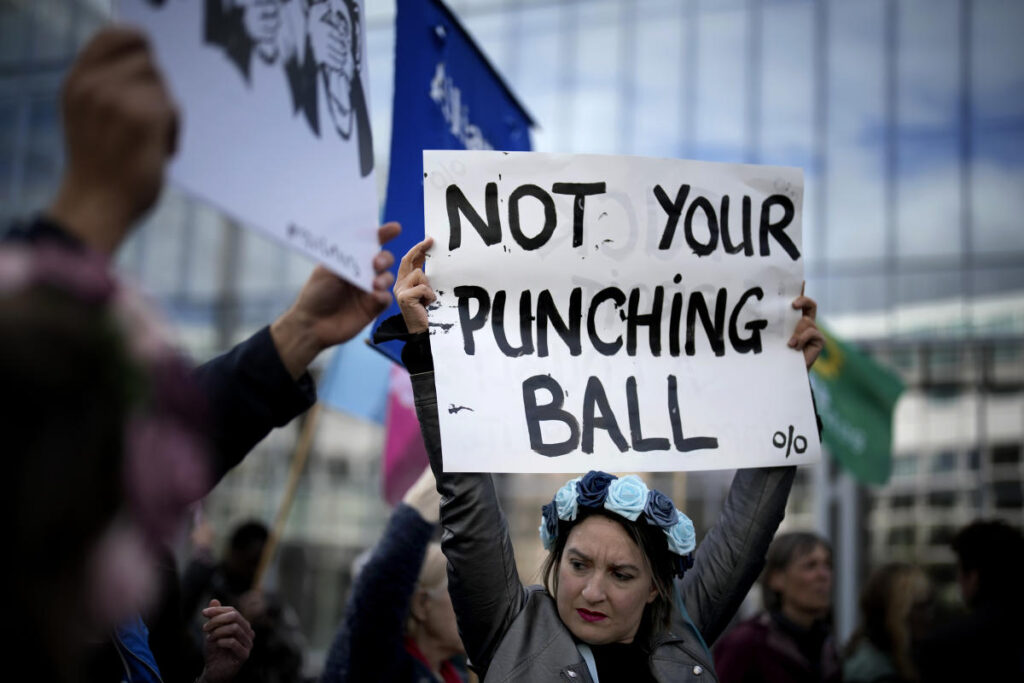In recent demonstrations throughout Paris and various French cities, men and women united to support Gisèle Pélicot, a victim of sexual violence whose harrowing experience has garnered national attention during the ongoing trial of her ex-husband and numerous other defendants accused of raping her while she was incapacitated. The public protests took place outside the criminal court in Paris, as well as in the southeastern city of Lyon, reflecting the solidarity of many who are confronting the severe implications of sexual violence highlighted by Pélicot’s decade-long ordeal. Since the trial began on September 2, Pélicot has displayed remarkable composure while facing her alleged rapists in the courtroom, thereby transforming the process into a prominent case that is challenging societal norms around such violence.
Pélicot has made the courageous decision to keep the trial public, resisting initial suggestions from the court to conduct proceedings behind closed doors. Activists and advocates for victims of sexual violence have praised her bravery and recognize the trial as emblematic of the ongoing fight against such abuse. One demonstrator representing the women’s rights group “Osez le féminisme!” (Dare to be feminist!) explained that while it is not the responsibility of all victims to disclose their identities, Pélicot’s choice to speak openly about her experiences is significant in raising awareness about the brutal realities many face. Her willingness to confront her traumas publicly presents a stark contrast to the typical silence that surrounds sexual violence, underscoring the necessity of addressing these issues within society.
Participants in the demonstrations voiced their frustrations with the French justice system’s perceived leniency towards sexual violence and the pervasive fear that many women experience in their daily lives. They held signs with messages such as “Shame must change sides” and “We are all Gisele. Are you all Dominique???” demonstrating a collective call for accountability and action against sexual violence. The trial has also shed light on the chilling confession of Dominique Pélicot, Gisèle’s ex-husband, who admitted to drugging her for nearly a decade and facilitating multiple rapes by inviting others to assault her while she was unconscious. This shocking acknowledgment lays bare the severe predatory behavior that often goes unchecked within intimate relationships.
As the trial progresses, the defendants—who range in age from 26 to 74—are divided in their claims regarding consent and culpability. While some deny raping Pélicot, arguing that they were manipulated or believed she was consenting, the broader implication of the case resonates with many attendees. This has fostered an atmosphere of disbelief that anyone could commit such atrocities, with one demonstrator highlighting the unsettling reality that rapists could be individuals found in everyday life. Such reflections prompt participants to confront not only the victims’ stories but also the systemic issues that allow such violence to perpetuate.
Supporters have hailed Gisèle Pélicot as an icon of resilience for her decision to expose her trauma and fight back against her abusers. Her courage serves as a source of inspiration, encouraging many to stand in solidarity and advocate for change regarding sexual violence. When sharing his thoughts at the rally, student Khalil Ndiaye expressed admiration for Pélicot’s determination to combat her pain by not succumbing to despair. Her unwavering stance has galvanized a broader movement, underscoring the importance of collective action against the normalization of sexual violence and the demand for better support systems for victims.
The trial is scheduled to continue until December, with many hopeful that its outcome will yield significant repercussions for both the perpetrators and the broader landscape of sexual violence in France. Gisèle Pélicot’s bold stance is seen as a catalyst for change and has sparked conversations about the necessity of challenging societal views on consent, accountability, and the experiences of survivors. In an environment fraught with fear and silence, Pélicot’s story serves to empower others, emphasizing that change is possible and that victims have the right to reclaim their narratives and advocate for justice.

